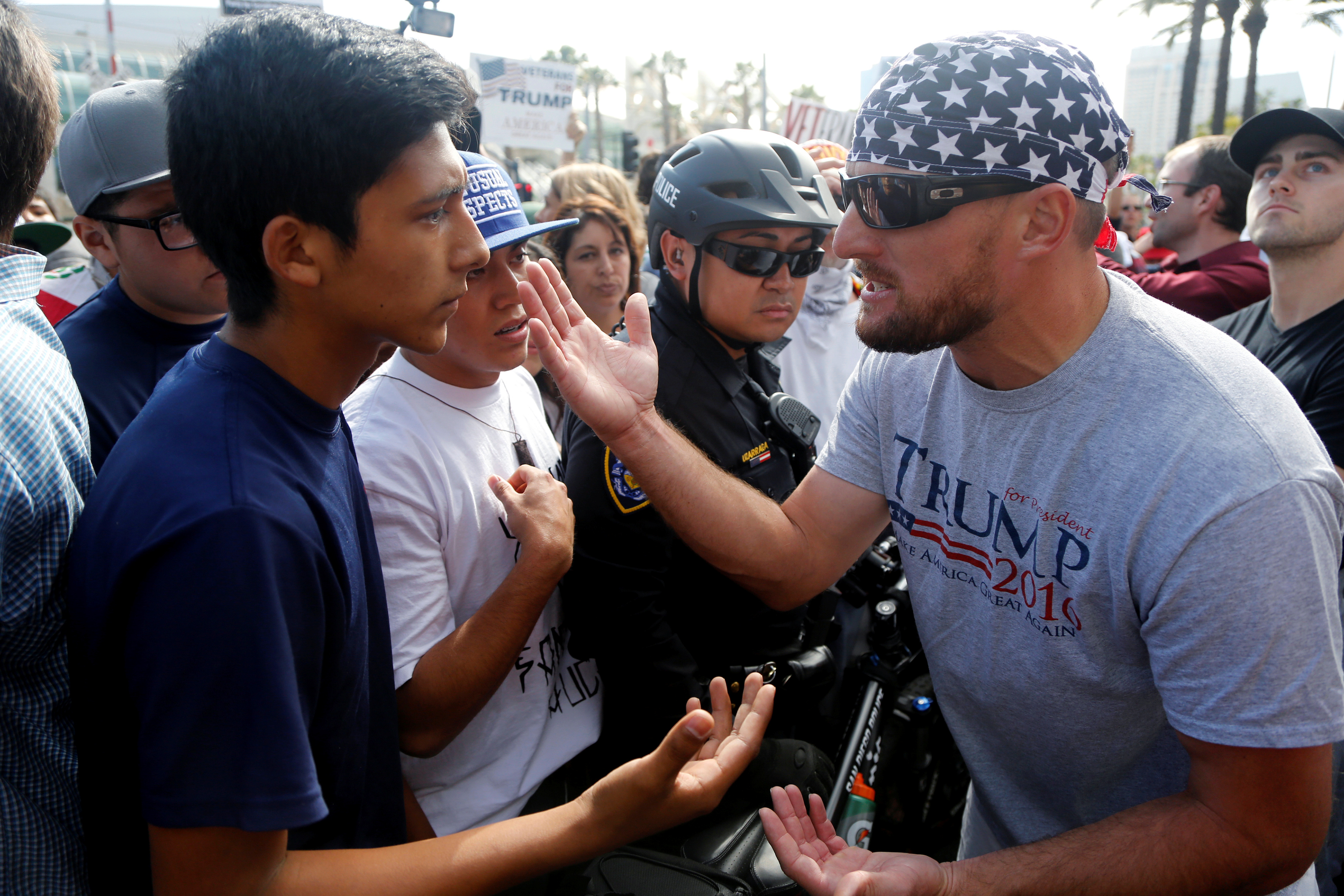I love America. It's Americans I hate.
Reflections on trying to reconcile my anti-Trump convictions with the actual human beings — family, friends, colleagues, and neighbors — who voted for this man


A free daily email with the biggest news stories of the day – and the best features from TheWeek.com
You are now subscribed
Your newsletter sign-up was successful
For years, my friend Jenny Boylan and I have had a recurring conversation about the purpose and value of our work. Jenny, an LGBTetc activist, has always been a buoyant believer in the power of language to overcome ignorance, misconception, and prejudice. She says: "It is impossible to hate anyone whose story you know." She engages with the public through public speaking, TV, and social media. I, a polemical cartoonist, would laugh in her face at her sweet naiveté. The public is a swarm of hostile morons, I told her. You don't need to make them understand you; you just need to defeat them, or wait for them die.
The 2016 election gave us both occasion to second-guess our positions.
Since that election, our debate has gone national. A lot of chastened liberals are telling each other that we need to really listen to the plaints of Trump voters, to try to understand them — exactly the sort of earnest effort at empathy that conservatives love to mock. Others wonder whether it isn't a misguided strategy to extend the benefit of the doubt and give fair hearing to people who have never once done the same for us. The time for civil discourse and debate is over, they say; the only course left now is resistance. A few of us are talking, after a couple drinks, about buying guns; if it comes to a fascist state or civil war, we figure, we don't want the red states to be the only ones armed.
The Week
Escape your echo chamber. Get the facts behind the news, plus analysis from multiple perspectives.

Sign up for The Week's Free Newsletters
From our morning news briefing to a weekly Good News Newsletter, get the best of The Week delivered directly to your inbox.
From our morning news briefing to a weekly Good News Newsletter, get the best of The Week delivered directly to your inbox.
Like a lot of people, I'm still trying to figure out what policy to adopt, and what marginal role I can play, in the incoming dystopia. My official policy toward a Trump administration is straightforward enough (even if implementing it won't be): Defy, paralyze, and undermine it in any way I can. What's going to be more complicated is formulating some coherent attitude toward the 62 million of my fellow Americans who elected that administration. How to reconcile my convictions with the actual human beings — family, friends, colleagues, and neighbors — who voted for this man?
A vote cast for Trump is kind of like a murder; there may be context to consider — a disadvantaged background, extenuating circumstances, understandable motives — but the choice itself is binary and final, irrevocable. There's a case to be made that it's indefensible; that his supporters have forfeited any right to be respected or taken seriously. The conservatives of the heartland have lashed back against the coastal elites' condescending, classist prejudices by defiantly confirming them: that they're pathetically dumb and gullible, uncritical consumers of any disinformation that confirms their biases, easy dupes for any demagogue who promises to bring back the factories and keep the brown people down.
Ignorance and bigotry are actually the best possible motives for having voted for Trump — they are at least honest, if not honorable. But I don't believe all Trump voters are ignorant, or bigoted; most of them are just evil — evil being defined not as anything so glamorous as beheading journalists or gunning down grade schoolers, but simply as not much caring about other people's suffering. They're willing to consign someone else — someone Mexican, or Muslim, or trans, not anyone they know — to exile, arrest, or second-class status, in exchange for... what? A tax break? To send a message to Washington, or the mainstream media? Just out of spiteful, petulant rage?
This kind of furious absolutism is a satisfying way to think, and I can't even argue it isn't valid. But it's also a kind of surrender — a mental secession, like emigrating to a Canada of the mind. The level of sustained rage it requires also threatens to harrow out your soul. Condemning half the human race — which is, after all, just another species — as insane or evil is usually a sign that something is off in your worldview.
A free daily email with the biggest news stories of the day – and the best features from TheWeek.com
Unlike a lot of people, who had to try to make conversation with conservative friends and family over the holidays, I only know two confirmed Trump voters. One of them is from Texas and the other's a Marine, so they both have their excuses. I recently sent a text to the former woman, letting her know I wasn't going to meet her for dinner while she was in town because I considered her vote for Trump unconscionable. I didn't feel I could politely ignore this vote, as though it had been for any ordinary callous avaricious Republican. But, having inflicted the negligible penalty of my absence on her, I didn't feel just or vindicated; instead I just felt like a heel. She'd just gone through a bad breakup with an abusive boyfriend, and my normal instinct would've been to have dinner with her just to cheer her up. Repressing your normal instincts toward kindness seems like the kind of thing Hitler used to recommend.
My feeling has always been that if a religion or ideology has become more important to you than actual human beings, something may have gone seriously wrong with your values. A religious aunt of mine was literally on her deathbed before she told her gay daughter that that she had always loved her and accepted her and her partner. It was a moving reconciliation, but it also seemed to me it might've been nicer if she'd done it 20 years earlier. It depresses me to see people obliged by moral or political convictions to repress their basic decency — even their love for their children — and act crueler than they really are.
I don't subscribe to the sophistry that being intolerant of intolerance is just as bad as intolerance itself — that, for instance, the humorless dogma of political correctness is as great an evil as good old-fashioned bigotry. But, as Nietzsche said, he who does battle with shitheads must beware that he does not thereby become a shithead. The most prejudiced people also tend to be the most provincial; they've never actually met any of the people they think they hate. (e.g.: an elderly friend of my mother's once complained about gays in the church to her male hairdresser.) And, thanks to the dissolution of civic society and the segregated informational communities of the internet, most of us no longer know anyone of a different political color anymore. So it's easy to turn them into slavering caricatures out of old propaganda posters.
The other Trump supporter I know, the Marine, is my neighbor. Even though he's the one who always wants to argue politics with me, and cites dodgy "facts" gleaned from Fox News or talk radio, I can't just cut off all relations with this guy, nor would I want to; we're friends. We've watched American Ninja together. He feeds 19 raccoons on his back porch nightly, all of whom are named Leonard. The last time I saw him he insisted on sending me home with a whole bottle of macadamia-nut liqueur. Those 62 million Trump voters are our neighbors. And one definition of a neighbor is someone who isn't going away. Unless you subscribe to the teachings of Jesus (as some Trump supporters purport to), you don't have to love your neighbor; what you do have to do is find a way to get along with him.
Having read this far, you may feel ripped off to learn that I don't have an answer. I'm approaching this as I do all ethical questions: completely ad hoc, making it up as I go, trusting to unpleasant feelings in my stomach. I'm afraid what will probably win out over my ideological convictions is my accursed, ineradicable niceness. Niceness — as distinguished from kindness — is not something I regard as a virtue; it feels more like a weakness. There comes a time when civility in the face of barbarism is folly. (It wasn't the example of our good manners that defeated fascism or abolished slavery.) It's just not clear at what point that time will have come, or whether it's already past.
As of this writing it's hard to find plausible cause for optimism. Politicians have been issuing pro forma calls for unity, healing, and "coming together" for decades, while the nation has grown ever more entrenched in mutual loathing. Both sides are morally indignant in their defense of the sacrosanct institutions of the Constitution, due process, and the rule of law as long as they're to their advantage, and trash them as soon as they're inconvenient. There no longer seems to be any consensual definition of "America." Whatever common ground we all once agreed on — democratic principles, common civility, the basic facts of current events — has vanished under rising sea levels of vitriol. Half of the country seems to feel that this could be a utopia if only the other half were exterminated. It all feels less like the raucous squabble of a democracy than a war, in which the object is to win by any means necessary, our fellow citizens have become The Enemy, civility is appeasement and fairness is collaboration.
I don't know whether there's still time for negotiations. But the day after the election I wrote my Marine neighbor to offer my somber congratulations: "I hope your guy is as good as you think he is," I said. He recently surprised me by telling me he thinks Edward Snowden is a hero, not a traitor, an attitude I never would've expected from him. And my Texan friend just emailed me words to the effect of: "Screw Trump. But screw Hillary too." This seemed like a false equivalency, but I let it go and accepted the conciliatory gesture. Such are the thin fingerholds we have to cling to as we contemplate the daunting ascent, by excruciating inches, up the sheer thousand-foot face of our incomprehension.
Tim Kreider is an essayist and cartoonist. He divides his time between New York City and an Undisclosed Location on Maryland's Chesapeake Bay. His latest collection of essays is We Learn Nothing.
-
 Switzerland could vote to cap its population
Switzerland could vote to cap its populationUnder the Radar Swiss People’s Party proposes referendum on radical anti-immigration measure to limit residents to 10 million
-
 Political cartoons for February 15
Political cartoons for February 15Cartoons Sunday's political cartoons include political ventriloquism, Europe in the middle, and more
-
 The broken water companies failing England and Wales
The broken water companies failing England and WalesExplainer With rising bills, deteriorating river health and a lack of investment, regulators face an uphill battle to stabilise the industry
-
 The billionaires’ wealth tax: a catastrophe for California?
The billionaires’ wealth tax: a catastrophe for California?Talking Point Peter Thiel and Larry Page preparing to change state residency
-
 Bari Weiss’ ‘60 Minutes’ scandal is about more than one report
Bari Weiss’ ‘60 Minutes’ scandal is about more than one reportIN THE SPOTLIGHT By blocking an approved segment on a controversial prison holding US deportees in El Salvador, the editor-in-chief of CBS News has become the main story
-
 Has Zohran Mamdani shown the Democrats how to win again?
Has Zohran Mamdani shown the Democrats how to win again?Today’s Big Question New York City mayoral election touted as victory for left-wing populists but moderate centrist wins elsewhere present more complex path for Democratic Party
-
 Millions turn out for anti-Trump ‘No Kings’ rallies
Millions turn out for anti-Trump ‘No Kings’ ralliesSpeed Read An estimated 7 million people participated, 2 million more than at the first ‘No Kings’ protest in June
-
 Ghislaine Maxwell: angling for a Trump pardon
Ghislaine Maxwell: angling for a Trump pardonTalking Point Convicted sex trafficker's testimony could shed new light on president's links to Jeffrey Epstein
-
 The last words and final moments of 40 presidents
The last words and final moments of 40 presidentsThe Explainer Some are eloquent quotes worthy of the holders of the highest office in the nation, and others... aren't
-
 The JFK files: the truth at last?
The JFK files: the truth at last?In The Spotlight More than 64,000 previously classified documents relating the 1963 assassination of John F. Kennedy have been released by the Trump administration
-
 'Seriously, not literally': how should the world take Donald Trump?
'Seriously, not literally': how should the world take Donald Trump?Today's big question White House rhetoric and reality look likely to become increasingly blurred
